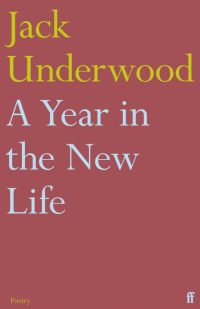A Year in the New Life (SHORTLISTED, TS ELIOT PRIZE 2021)
In Jack Underwood’s timely second poetry collection, A Year in the New Life, he considers his place in the world having become a father. Underwood exposes his innermost deliberations and fears, placing them within a world that is becoming increasingly alien for all of us. In a review for The Guardian, Sean O’Brian remarks on the ‘intense self-conscious’ of Underwood’s debut collection, Happiness. This quality permeates this new collection too as the poet explores the responsibility and experiences of fatherhood at the interface of society; poems riff off poems as he makes sense of the enormity of this new role.
The collection is entered through the quiet of ‘Errata’ as the speaker shares the dying thoughts of a grandfather who ‘explained/ that letting go is the easy part’ equating ‘God’ and ‘time’ as ‘the same thing,’. As the poem progresses, the speaker considers the fallibility of memory:
I’m sure I’ve not remembered
or measured correctly[.]
The imagery creates a sense of ‘crossing’ over, of being uplifted ‘on the wing’ yet ‘fog […] rising’ reflects living; it is disorienting, blinding, and the truth must be sought as the speaker declares – I must go in – the ‘I’ speaks only for itself, whilst the italics chime with the assonance of ‘in’. Perhaps this is the sound of grief, as:
a boat
is getting quietly away at night.
Literary influences, borrowed lines from poems, but not as epigraphs, make statements; it is as if Underwood has cast a net, gathering experiences to create something new, as can be seen in ‘Poem Beginning with Lines by Elizabeth Barrett Browning’. We recognise angst in:
But I could not hide
My quickening inner life from those at watch[.]
and identify with his uncertainty in:
I’ve no idea what drags the chair, bruises
the fruit [….]
Underwood’s work has a depth which, at times, I find unfathomable in terms of getting to the truth of the matter. Yet the profundity that burrows into his lines is infused with humour. He demonstrates a poetic aptitude to pluck a mundane image and rearrange it into something truly spectacular, an element that makes Underwood’s poems distinctive.
Take ‘Fifteen Babies in My Garden’ a poem with a dream-like quality, where the speaker carries ‘a large tray of drinks out to them’. The ‘apple scented’ sunshine creates a false sense of security as the speaker asks, ‘What are you guys talking about?’. Despite the tone shifting to a sinister note, the comedic element is not lost when ‘a fully grown adult baby [,] their designated speaker’ announces:
We were just talking about the ruinous
and beautiful ways we’re going to break
your dumb old heart, and totally fuck
your life up’ and they all start laughing.
Despite the anxieties that peppers Underwood’s work, he has an innate ability to teach the reader to simply sit and observe. This adds a tender playfulness that balances the density of his thematic preoccupations, such as ‘I’m on the boating lake with Sean’, a snapshot of a languid day that ‘undulates’ as the speaker is:
picturing […]
brown paper bags with little grease spots
near the bottom seams that have recorded the way
sausage rolls have touched them […]
The collection brims with Underwood’s imaginings of fatherhood. The weight of his emotional investment is contained in the typeset as he acknowledges ‘[…] Love has always been a loss of risklessness [,]’ and he seeks assurance from his partner:
I truly feel the mind
is not an all-purpose device.
Sometimes the sky needs its tattered flag.
until fear,
I am so scared, aren’t you?
yields to wonder:
There is a supermassive black hole four million times
the mass of the sun at the centre of our galaxy
and she already responds to our voices.
Wanda McGregor.


Leave a Reply